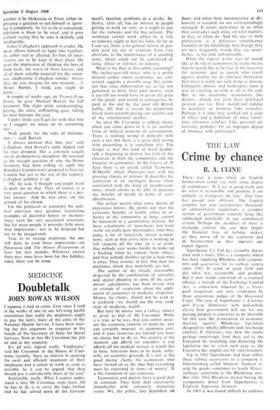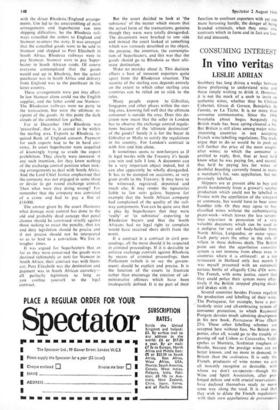THE LAW
Crime by chance
R. A. CLINE
There was a time when an English businessman could say with some degree of confidence: 'If I act in good faith and do what is reasonable and prudent. I am unlikely to transgress the law.' That time has passed into oblivion. The English criminal law now incorporates thousands of administrative regulations, a complex system of government controls lying like submerged minefields in our commercial system. Perhaps the deadliest of these is exchange control, the one that blights the financial lives of holiday makers as they move off to the continent and of businessmen as they improve our export figures. There was a time when an English businessman could say with some degree of confidence: 'If I act in good faith and do what is reasonable and prudent. I am unlikely to transgress the law.' That time has passed into oblivion. The English criminal law now incorporates thousands of administrative regulations, a complex system of government controls lying like submerged minefields in our commercial system. Perhaps the deadliest of these is exchange control, the one that blights the financial lives of holiday makers as they move off to the continent and of businessmen as they improve our export figures.
Superheater Co Ltd has recentlty deton- ated such a mine. This is a company which has been supplying Rhodesia with compon- ents and accessories for its railway system since 1942. It acted in good faith and did what was reasonable and prudent. But it now stands convicted of a criminal offence, a breach of the Exchange Control Act, a conviction imposed by a Liver- pool magistrate and now confirmed by three unanimous judges of the Divisional Court. The case of Superheater v. Customs and Excise illuminates with melancholy clarity how government will use for any passing purpose it conceives to be desirable (in this case the prosecution of economic warfare against Rhodesia) legislation designed for wholly different ends (exchange control). It illustrates, too, how the courts perhaps unwittingly lend their aid to the Executive by stretching and distorting the legislative net to catch such prey as the Executive has singled out for extermination Up to 1962 Superheater had been selling these railway accessories to a company it Johannesburg called Stamcor. Stamcor re sold the goods sometimes to South Africa railways, sometimes to the Rhodesian ones But after 1962 Rhodesia started buying the components direct from Superheaters in England. bypassing Stamcor.
In 1965 it was found difficult to continue
with the direct Rhodesia/England arrange- ments. UDI led to the unscrambling of most arrangements and Superheater ran into shipping difficulties. So the Rhodesia rail- ways cancelled the orders to England and Stamcor re-enters the story. it was arranged that the cancelled goods were to be sold to Stamcor and shipped to Port Elizabeth in South Africa. Rhodesia railways were to pay Stamcor. Stamcor were to pay Super- heater in South African rands. Of course everyone contemplated that the goods would end up in Rhodesia, but the actual purchaser was in South Africa and delivery from England was to the purchaser in the latter country.
These arrangements were put into effect. In law Stamcor alone could sue the English supplier, and the latter could sue Stamcor. The Rhodesian railways were no party to the transaction, but were the ultimate re- cipient of the goods. At this point the dark clouds of the criminal law gather.
For in December 1965 Rhodesia was 'prescribed', that is, it ceased to be within the sterling area. Exports to Rhodesia re- quired Bank of England consent. Payment for such exports had to be in hard cur- rency. In court Superheater were acquitted of knowingly trying to evade the export prohibition. They clearly were innocent if any such intention, for they knew nothing of the exchange control position when mak- ing arrangements to deal with South Africa. And the Lord Chief Justice emphasised that the company was not engaged in some sham or device to get round exchange control. Then what were they doing wrong? For remember that the company was convicted of a crime and had to pay a fine of £14,000.
The answer given by the court illustrates what damage state control has done to the old and probably dead concept that penal clauses should be construed strictly against those seeking to exact the penalty, that tax and duty legislation should be precise and if not precise should not be interpreted so as to lead to a conviction. We live in tougher times.
It was argued for Superheaters that as far as they were concerned the goods were destined (ultimately or not) for Stamcor in South Africa; their contract was with Stam- cor, Port Elizabeth was the destination and payment was in South African currency— all perfectly legitimate so long as you confine yourself to the legal contract. But the court decided to look at 'the substance' of the matter which means that the actual form of the transactions, genuine though they were, were totally disregarded. The documents were brushed to one side and instead the court looked at something which was variously described as the object, the purpose, the intention, the contempla- tion of Superheaters, and this was that the goods should go to Rhodesia as their ulti- mate destination.
Make no mistake about it. This decision affects a host of innocent exporters quite apart from the Rhodesian situation. The security of the sterling area depends entirely on the extent to which other sterling area countries can be relied on to stick to the rules.
Many people export to Gibraltar, Singapore and other places within the ster- ling area, knowing full well that the ultimate consumer is outside the area. Does this de- cision now mean that the seller in London has to observe the exchange control regula- tions because of the 'ultimate destination' of the goods? Surely it is for the buyer in Gibraltar or Malta to satisfy the regulations in his country. For London's contract is with him and him alone.
It sometimes seems to non-lawyers as if in legal tussles with the Treasury it's heads you win and tails I lose. A document can be a very important object indeed, but it can also apparently be wholly disregarded. It has to be stamped on occasions, at very great profit to the Treasury. It may have to be witnessed, registered, deposited and much else. It may render the signatories liable to law suits galore. Suppose for example that the South African company had complained of the quality of the rail- way components. You can be quite sure that a plea by Superheaters that they were 'really' or 'in substance' exporting to Rhodesian buyers and that the South Africans had no legal right to complain would have received short shrift from the court.
If a contract is a contract in civil pro- ceedings, all the more should it be respected in criminal proceedings. If it is desirable to enforce exchange controls against Rhodesia by means of criminal proceedings, then Parliament (which is to say the govern- ment) should be explicit and precise. It is the function of the courts to frustrate rather than encourage the creation of ad- ministrative offences which have been inadequately defined. It is no part of their function to confront exporters with yet one more harassing hurdle, the danger of being branded criminals, when they enter into contracts which in form and in fact are law- ful and innocent.



































 Previous page
Previous page